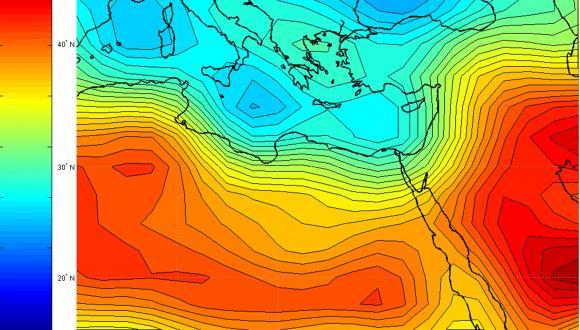Climatic-environmental Research Group
The studies combine theoretical and applied aspects of synoptic climatology, regional climatology, climate change, urban climatology and applied climatology, encompassing assorted spatio-temporal scales; from large to synoptic to local and micro-climatic in space, and from analysis of specific weather events to climatological documentation, as well as research of variations and long-term climate changes and future predictions.
Climatological-synoptic research – some examples: Development of a new methodology to identify daughter cyclone formation with respect to the parent cyclone's frontal system – and application for the Mediterranean Basin; Synoptic evolution scenarios associated with prolonged dry spells within the rainy season in Israel; Development of advanced methods for identification and classification of the Red Sea Trough and its active phase, with application to related evolution scenarios and to future changes; Study of anomaly of the movement of upper-level troughs and its relation to rainfall anomaly over the Levant; Development of a new synoptic classification for the Levantine summer season, using an “environment to climate” approach. We perform climatological-synoptic research using statistical downscaling techniques from synoptic-scale atmospheric variables to local weather conditions. For example, relating synoptic-scale atmospheric variables with wave storms along the Mediterranean coast of Israel.
Climate change – this being a focus of global and regional climate research, with the Mediterranean basin defined as a "hot spot" in climate change observations and future prediction, our studies investigate trends in climate regimes (rainfall, temperature, humidity and heat stress) and their relationship to synoptic and large-scale variability.
Climatic-environmental aspects and urban climate – our studies focus on the "urban heat island" phenomenon, its relation to synoptic conditions, wind regime and regional to global warming. We develop methods for evaluating the intensity of the UHI. Our climatic-environmental studies investigate meteorological aspects of air pollution, for example, the relation between pollution of particle matter and summer climatic stress in the Haifa metropolitan area, Israel. Other studies analyze relations with ecological and agro-meteorological variables. For example: The structure of the rainy season in Israel and its ecological implication on amphibians; The impact of pine forest thinning on micro-climate conditions and relation to ant community; The impact of climate variations and climate change on the growth of deciduous fruit trees in Israel, for evaluation of future potential.
Joint research with the Laboratory for Contemporary Urban Design (LCUD) – investigation of climate considerations in urban landscape planning, with a focus on human comfort in urban parks, for example, the potential of green infrastructure for urban heat mitigation and its role in urban planning.


